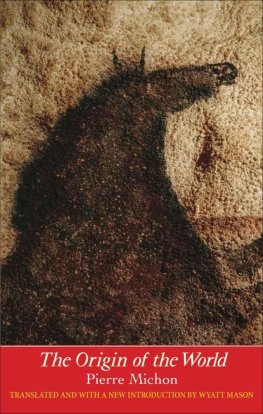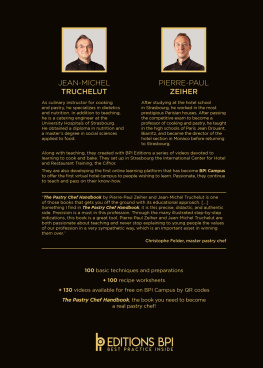Deshays Elizabeth - Small Lives
Here you can read online Deshays Elizabeth - Small Lives full text of the book (entire story) in english for free. Download pdf and epub, get meaning, cover and reviews about this ebook. City: New York, Creuse (France), France--Creuse, year: 2012, publisher: Archipelago Books, genre: Detective and thriller. Description of the work, (preface) as well as reviews are available. Best literature library LitArk.com created for fans of good reading and offers a wide selection of genres:
Romance novel
Science fiction
Adventure
Detective
Science
History
Home and family
Prose
Art
Politics
Computer
Non-fiction
Religion
Business
Children
Humor
Choose a favorite category and find really read worthwhile books. Enjoy immersion in the world of imagination, feel the emotions of the characters or learn something new for yourself, make an fascinating discovery.

- Book:Small Lives
- Author:
- Publisher:Archipelago Books
- Genre:
- Year:2012
- City:New York, Creuse (France), France--Creuse
- Rating:4 / 5
- Favourites:Add to favourites
- Your mark:
- 80
- 1
- 2
- 3
- 4
- 5
Small Lives: summary, description and annotation
We offer to read an annotation, description, summary or preface (depends on what the author of the book "Small Lives" wrote himself). If you haven't found the necessary information about the book — write in the comments, we will try to find it.
Abstract: Pierre Michons Lives Under Glass was called his chef-doeuvre by Le Monde
Small Lives — read online for free the complete book (whole text) full work
Below is the text of the book, divided by pages. System saving the place of the last page read, allows you to conveniently read the book "Small Lives" online for free, without having to search again every time where you left off. Put a bookmark, and you can go to the page where you finished reading at any time.
Font size:
Interval:
Bookmark:

Pierre Michon
Small Lives
Translated from the French
by Jody Gladding and Elizabeth Deshays
archipelago books
English Translation Copyright Jody Gladding and Elizabeth Deshays, 2008
Copyright Pierre Michon, Editions Gallimard, 1984
First Archipelago Books Edition
All rights reserved.
No part of this book may be reproduced or transmitted in any form
without prior written permission of the publisher.
Library of Congress Cataloging-in-Publication Data
Michon, Pierre, 1945
[Vies miniscules. English]
Small lives / by Pierre Michon;
translated by Jody Gladding and Elizabeth Deshays.
p. cm.
ISBN 978-1-9357447-0-2
I. Gladding, Jody, 1955 II. Deshays, Elizabeth. III. Title.
PQ2673.I298V513 2008
843'.914dc22 2007050889
Archipelago Books
232 Third St. #A111
Brooklyn, NY 11215
www.archipelagobooks.org
Distributed by Consortium Book Sales and Distribution
www.cbsd.com
Cover art: Portrait of a One-Eyed Man by Vincent van Gogh, 1888
This publication was made possible with support from Lannan Foundation,
the National Endowment for the Arts, the New York State Council on the Arts,
a state agency, and the French Ministry of Culture.

to Andre Gayaudon
Contents
Par malheur, il croit que les petites gens
sont plus rels que les autres.
ANDR SUARS
Small Lives
Let us explore a genesis for my pretensions.
Was one of my ancestors a fine captain, a young, insolent ensign, or fiercely taciturn slave trader? East of the Suez, some uncle gone back to Barbary in a cork helmet, wearing jodhpur boots and a bitter smile, a stereotype warmly endorsed by younger branches of the family, by renegade poets, all those dishonored ones full of honor, shadow, and memory, the black pearls of the family trees? Did I have some colonial or seafaring antecedent?
The province I am speaking of has no coasts, beaches, or reefs; no exalted Saint-Maloin or haughty Moco hears the call of the sea when the west winds, purged of salt and coming from far off, pour over the chestnut trees there. Nevertheless, two men familiar with those chestnut trees no doubt took shelter there from the rain, perhaps they loved and certainly they dreamed there, then sought very different trees under which to work and suffer, not to assuage their dreams, perhaps to continue to love, or simply to die. One of these men I have heard about; the other I believe I remember.
Once in the summer of 1947, under the big chestnut tree in Les Cards, my mother carried me in her arms to the place where the village road can suddenly be seen emerging, hidden until that point by the wall of the pigsty, hazel trees, shadows. It was a beautiful day, my mother no doubt wearing a light dress, me babbling; on the road, preceded by his shadow, was a man unknown to my mother. He stopped, he looked, he was moved; my mother trembled a little; the inhabitual held its rest, suspended among the fresh notes of the day. Finally the man took a step forward and introduced himself. It was Andr Dufourneau.
Later, he said he thought he had recognized in me the baby girl who had been my mother, likewise an infant and still helpless, when he left. Thirty years, and the same tree that was the same, and the same child that was another.
Many years earlier, my grandmothers parents had asked the state to place an orphan with them to help on the farm, as was common practice then, at a time before such contorted, complacent mystification turned parenting into an extravagant, flattering and flattening mirror, in the guise of protecting the child. Then, it was enough if the child was fed, slept under a roof, and, from contact with his elders, learned the few gestures necessary for that survival from which he would make a life. As for the rest, it was assumed that youth in itself made up for the lack of tenderness, the cold, hardships, and long labor, sweetened by buckwheat cakes, beautiful evenings, air as good as the bread.
Andr Dufourneau was sent to them. I like to think that he arrived one October or December evening, soaked from the rain or red-eared from the bitter frost. His feet struck that path that they would never again strike for the first time. He looked at the tree, the cowshed, the way the landscape stood out from the sky, the door. He looked at the new faces under the lamp, surprised or moved, smiling or indifferent. What he was thinking we will never know. He sat down and ate the soup. He stayed for ten years.
My grandmother, who got married in 1910, was still a girl. She grew attached to the child, whom she surely embraced with that gentle kindness of hers that I knew and with which she tempered the rough good nature of the men he accompanied to the fields. He had not gone and never did go to school. She taught him how to read and write. (I imagine a winter evening; the cupboard door creaks as a young peasant girl in a black dress opens it and takes down from the top shelf a small exercise book, Andrs Book, sits down beside the child who has washed his hands. Amidst the patois chatter, one voice distinguishes itself, strikes a higher note, strives for richer tones to shape the tongue around richer words. The child listens, repeats after her, timidly at first, then with confidence. He does not know yet that for those of his class and condition, born close to the earth and quick to fall back to it once again, la Belle Langue does not lead to grandeur, but to nostalgia and the desire for grandeur. He ceases to belong to the moment, the salt of hours becomes diluted, and in the agony of the past that is always beginning, the future rises and immediately begins to flow. The wind beats the window with a bare wisteria branch. The childs frightened gaze wanders over the geography map.) He did not lack intelligence; no doubt people said that he learned quickly. Thus, based on these vague signs, and with the modest, lucid good sense of peasants in those days, who equated intellect with social rank, my ancestors developed a story to explain such incongruous qualities in a child of his condition, more in keeping with how they perceived reality: Dufourneau became the illegitimate son of a local squire, and everything was restored to order.
Who could say now if he was informed of this fantastical ancestry, born of the imperturbable social realism of the poor? It does not matter. If so, he thought of it with pride and resolved to win back, without ever having possessed, all he had been robbed of by his illegitimacy. If not, a vanity took hold in this peasant orphan, raised with vague respect perhaps, certainly with unusual consideration, that seemed to him all the more deserved, unaware as he was of its cause.
My grandmother got married. She was barely ten years older than him, and the adolescent he had already become may have suffered because of it. But my grandfather, I will say, was jovial, welcoming, a generous man and mediocre farmer. As for the child, I believe I heard my grandmother say, he was pleasant. No doubt the two young men liked one another, the cheerful victor of the moment with his blond moustache, and the other, the smooth-cheeked, silent one, secretly called, awaiting his hour; the eager one chosen by the woman, and the calmly flexed one chosen by a destiny greater than woman; the one who made jokes, and the one who was waiting for life to allow him to do so; man of earth and man of iron, without prejudice to their respective strengths. I see them going off to hunt; their breath, dancing slightly in the air, is swallowed by the fog; their silhouettes fade into the edge of the woods. I hear them sharpen their scythes, standing in the spring dawn; then they walk and the grass is laid low, and the scent of it grows with the day, exacerbated by the sun. I know that they stop at noon. I know under which trees they eat and talk; I hear their voices but do not understand them.
Next pageFont size:
Interval:
Bookmark:
Similar books «Small Lives»
Look at similar books to Small Lives. We have selected literature similar in name and meaning in the hope of providing readers with more options to find new, interesting, not yet read works.
Discussion, reviews of the book Small Lives and just readers' own opinions. Leave your comments, write what you think about the work, its meaning or the main characters. Specify what exactly you liked and what you didn't like, and why you think so.










